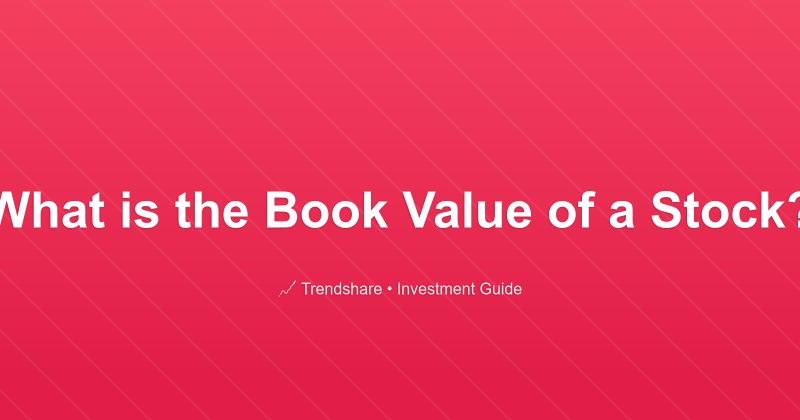
What is the Book Value of a Stock?
By Ethan Mercer
Financial Technology Analyst • 10+ years in fintech and payments
What is the book value of a stock? Why book value matters when investing in a company.
You're interested in buying a stock. You've done your research and you believe the company has a great product. It knows its customers. It has been making a profit (earning real money) and you believe the stock is priced fairly.
How do you measure your risk?
The Biggest Risk in Investing is Bankruptcy
The worst risk is that the company may go bankrupt and have to sell off all of its assets to pay off its creditors. If that's the case, what happens to you as a shareholder? Whatever's left after those creditors take their cut is available to you. That might not be much.
To minimize your risk of a bankruptcy scenario, you have to know what the company is worth.
What Happens in Bankruptcy?
What happens in a bankruptcy? Any company has assets (things of value) and liabilities (debt owed). In a bankruptcy situation—going out of business—a business will best to pay back those liabilities by selling off its assets. Whatever money it can get from that goes to its creditors.
As you might expect, that scenario has a lot of wiggle room. A Canadian Maple Syrup company facing total liquidation in bankruptcy might not be able to sell off its inventory of maple syrup or glass bottles or a label-printing factory at full cost (especially if there's no demand for syrup and that's why the business is in trouble). Just like with other investments (and especially with penny stocks), you can't tell what someone will pay for an asset until you find a buyer to sign the check.
You can, however, get a pretty good idea.
What is Book Value?
A business's book value is the amount of its assets minus its liabilities. This is easy to calculate from a financial statement. You'll often see it stated as owner equity or shareholder equity.
This figure can be a little vague—who knows how much your maple syrup factory can sell for in a fire sale?—but it's a good estimate. If you compare the book value to the market capitalization of the company, you've measured investor sentiment toward the stock. If the book value is less than the market value, investors may think the company has less tangible assets (a strong brand, goodwill among customers, patents or trademarks or trade secrets) that will influence how much money the company can make. If the book value is greater than the market value, the stock may be underpriced; you may have found a value.
Limits of Book Value
Of course, book value doesn't take into account the value of future earnings of the company. It's an estimate and a snapshot of current assets and liabilities. It can help you decide how much risk you have of losing your investment in bankruptcy (though it usually can't tell you how much risk there is of the company going bankrupt, unless the book value is abysmally low).
A stock with a high book value compared to its market cap may have an asset that the price of the stock doesn't yet reflect. For example, a national retailer may own a lot of prime real estate in malls and shopping centers across the country. If the value of that land has increased—even if the shopping business stays flat—the book value may increase.
Analyzing Companies with Financial Ratios
As usual, your best option is to compare the financial ratios and measurements of companies in similar industries and investment sectors. It's harder to manipulate this number than it is to massage earning numbers with GAAP, which means that the book value is often more informative to value investors than the P/E ratio. Yet unlike present value calculations favored by value investors, it only takes into account reported assets and liabilities.
Book value is a single data point which may help you identify good stocks worth investing in. It's not the only number to track. It's not the most important number to track, either—but when you see an outlier, that's a sign you should look more closely at the company.
Investment Disclaimer
This article is for educational purposes only and does not constitute investment advice. Stock prices, financial metrics, and market conditions change constantly. Company examples are provided for illustration and should not be considered recommendations. Always verify current data from official sources such as company investor relations pages or SEC filings, assess your own risk tolerance and investment objectives, and consult a qualified financial advisor before making investment decisions. Past performance does not guarantee future results.